A 2014 study threw light on some mind-numbing facts. It stated that we end up getting angry with and hurting those who are the closest to us. It also proved that how we hurt them “depends on our relationship with them.” Interesting, isn’t it? So, apparently, the closer we are to people, the higher our tendency to lash out at them, devalue them or neglect them. And if you’ve inadvertently hurt your SO and are wondering how to forgive yourself for hurting someone you love so dearly, you’re at the right place.
In this article, we’ll look at self-forgiveness psychology with insights from California-based psychiatrist and cognitive behavior therapist Dr. Shefali Batra (MD in Psychiatry), who specializes in counseling for separation and divorce, breakup and dating, and premarital compatibility issues. Let’s delve deeper into what it implies to forgive yourself if you’ve been rude to or hurt someone dear to you. Stop asking yourself, “Why can’t I forgive myself or forget what I did to hurt my partner?” Stop feeling guilty too often for messing up your bond with a loved one. We’ll tell you how…
What Does It Mean To Forgive Yourself — Understanding The Self-Forgiveness Psychology
Table of Contents
Before we get on with how to forgive yourself for something unforgivable that you may have done to hurt your partner or something hurtful that you may have said to them, let’s look at the concept of self-forgiveness and see what it entails. So, what is forgiveness? Dr. Batra says, “Forgiveness could involve thoughts, emotions, and actions. But self-forgiveness is actually more difficult than forgiving others.”
Related Reading: How To Forgive Yourself For Cheating And Not Telling – 8 Helpful Tips
She then goes on to explain the situation from the Freudian perspective. Here’s what she says can happen if you willingly or unwillingly hurt someone you love:
- The superego is the morality principle in the human mind. It is also what makes you feel guilty
- The thought component implies getting repetitive self-derogatory thoughts because of what you did
- The emotional dimension translates to responding to those thoughts and feeling low, bad, sad, and depressed
- The behavioral component could involve avoiding meeting the person or not engaging in specific activities to avoid the person you thought you’ve hurt (or even people who know them)
Forgiveness could involve thoughts, emotions, and actions. But self-forgiveness is actually more difficult than forgiving others.
— Dr. Batra
And what does it mean to forgive yourself in such scenarios? Well, Dr. Batra explains, “Forgiving yourself for past mistakes means identifying the thoughts that are causing your negative feelings and emotions and leading to specific dysfunctional and self-sabotaging behaviors.” This can happen naturally over time, or you may need to speak to a professional counselor who can modify your thinking and feelings to more constructive, adaptive, and functional results.
Echoing similar thoughts, a Reddit user says, “It is important to forgive yourself because it allows you to let go of the anger, sorrow, pain, and sadness attached to the situation that’s bothering you. You have to know how to accept responsibility for your actions without making excuses or beating yourself up. Because in that process you show growth. You show that you are making progress on becoming a better version of yourself.”
Guilt complex and self-forgiveness
Before we delve deeper into the concept of self-forgiveness, let’s look at what ‘guilt complex’ is. Guilt complex is a continuous feeling that you may have hurt someone intentionally or otherwise. The feeling, if not checked, can later turn into a psychologically devastating situation, wherein you may end up with:
- Chronic anxiety
- Depression
- Low self-worth
- Self-harm
- Sleep issues
- Suicidal thoughts
How to deal with guilt
If you have been wondering how to deal with guilt, know that self-forgiveness is the only way you can address this issue of past mistakes causing anxiety and other ailments. But how do you go about it? Here are some ways of resolving guilt through self-forgiveness suggested by Cornish and Wade in 2015:
- Take responsibility for your actions: Be aware of where you went wrong and own up to your mistakes
- Go through remorse: Instead of neglecting your emotions, go through remorse. The pain of having harmed a person should be felt in all its intensity for it fades in the end
- Restore and rebuild trust in relationships: In order to make things right, a person going through intense guilt has to first apologize to the other person. They should talk it out and repair the relationship
- Renew your worth: This is where self-forgiveness peaks and restores the guilty person’s self-worth. At the same time, the person suffering from guilt learns from the experience and is able to make better choices later.
Now that we know what self-forgiveness psychology is all about, in the next section, let’s look at how to stop feeling bad about something you did to your partner.

15 Expert-Backed Tips On How To Forgive Yourself For Hurting Someone You Love
If you’re still wondering why people always and invariably end up hurting those whom they love, well, here are some insights from a Swaddle article, where psychologist Dr. Alexandra Solomon explains why this happens. She says, “It’s all a weird side effect of what happens when you cultivate safety and intimacy and love — there’s less vigilance and self-monitoring, so we often end up doing or saying things we don’t love.”
Take the case of my friend, Shania, for instance. Being a caring homemaker, she was always busy with her husband and her kids. She spent her entire day making sure her husband had his meals on time, her kids were picked up from school, and her house was sparkling clean, until one fine day, she lost her cool for some reason and had a bitter argument with her husband. She ended up being verbally abusive and saying some harsh words, accusing him of treating her like a doormat.
If we go by Dr. Solomon’s diagnosis of such scenarios, Shania was probably tired of all the emotional labor and vent her frustration at the person she was closest to — her husband. How can you bounce back from such a bad situation and stop feeling guilty? What’s the secret to forgiving yourself for past mistakes that you’re truly ashamed or embarrassed of now? Here are 15 tips from our expert Dr. Batra that explain how to forgive yourself for something unforgivable that you may have done/said to your partner:
Related Reading: 12 Sincere Ways To Apologize To Someone You Hurt
1. Try to be objective
Dr. Batra says, “Obviously when you feel you have hurt someone, you are the antagonist in the story. It becomes very difficult for you to look at the scenario objectively. You are bound to think that you were the perpetrator of pain and the other person was at the receiving end.” However, this isn’t the right approach. Be objective and look at it this way: you may have had your reasons. Try to be a third person, without blaming yourself, and realize that you could not have done it any other way.
To judge the situation anew, you need to understand that the past does not affect your current thoughts and feelings.
— Dr. Batra
2. Recognize your limitations
One of the ways you can address the “how to stop feeling bad about something you did” conundrum is by understanding that nobody’s perfect. Yes, it’s a good thing to be aware of your flaws, but as Dr. Batra says, “Try not to obsess over your flaws and imperfections. You must realize that everyone has their limits and if you had reached yours in the heat of the moment and said/done something you regretted later, it does not mean that you are not a good person.”
In fact, if you have engaged in undesirable behavior and hurt someone you love, you need to cut down on all the self-blame and accept that you need to control your emotions and address your limitations.
3. Identify hindsight bias
Letting go of past mistakes and guilt may not be easy but is necessary. Dr. Batra brings in the hindsight bias while explaining how to forgive yourself for hurting someone you love. She says, “The hindsight bias can distort your perception of past events. To judge the situation anew, you need to understand that the past does not affect your current thoughts and feelings.”
To explain it simply, hindsight bias is when you feel your past decisions could’ve been better made (just because you have better knowledge of the situations now). So, when you ditch the hindsight bias, you realize you are not the ‘bad person’. The circumstances made you behave the way you did. And how does this help? Here’s how:
- It makes you feel better and lighter when you realize that you did the best you could with what you had at that given time (and in your past emotional state)
- It may also aid you in similar situations later, where you may feel and think the same way
Related Reading: What Is Forgiveness In Relationships And Why Is It Important
4. Acknowledge cognitive dissonance
“Sometimes you know that what you did was right and that there was no other way, but at the same time, you continue to tell yourself that you had an option. You may be blaming yourself for not responding to their texts on time or for not calling them more regularly to fix things. But at the given time, you may have thought the no-contact rule was working. You argue, considering both sides of the coin,” says Dr. Batra. This is where cognitive dissonance comes in. It’s when you convince yourself that you’ve made the right decision after a prolonged internal conflict between two contradictory beliefs.
So, when you’re confused by a flurry of thoughts, what helps is just understanding and telling yourself that you did your best. This brings in a synchrony between your thoughts and emotions and helps you acknowledge the fact that you too are human and it was another human action to have lashed out at or hurt your partner.

5. Change your narrative
Dr. Batra has this to say to those who find it difficult to forgive themselves after hurting their loved ones: “Try to alter your ways of speaking to yourself. Your behavior stems from your thoughts, and if you go on believing that you are a ‘bad person’ instead of someone who just made a mistake or did not have a choice, you will continue to blame and adjudicate yourself.”
Here are a few statements she suggests adding to the narrative:
- I did my best
- I meant no harm
- I just did not have a way to make it work and hence I had to let go
- I wish and hope that this person heals. I will always wish him or her well
Related Reading: How To Forgive And Forget In A Relationship
6. Assess the situation
Another way to address the “how to stop feeling bad about something you did” issue is to dissect the situation. Dr. Batra also suggests assessing the situation and asking yourself a few questions before you start negative self-talk and make yourself the villain. So, the two basic concerns that you can focus on while dissecting the situation are:
- How did the scenario impact you before you reacted?
- What was the root cause behind your reaction?
- If you decided to call off a relationship or take a break for a while, why did you do so?
Once you have some clarity about the situation, you will stop dwelling on the past and start accepting that things happen and the only way is to move forward. You see, hurt people often end up hurting others, and this is why you need to find out why you reacted the way you did. Once you start taking care of your mental health, things are bound to fall into place.
7. Talk to a third person
You see, things are often easier said than done. And no matter how many times you try to be objective or take on the role of a third person to judge the situation without bias, you will end up bringing in some bias. Likewise, you can’t be the only person you reach out to in such times. So, Dr. Batra says, “You should seek a third person’s perspective so that you can see things more objectively and address your mental health.” And this third person can be:
- A trusted friend
- A family member
- A counselor
Related Reading: Healthy Flirting Isn’t Damaging But Are You Crossing The Line?
8. Express remorse
Well, letting go of past mistakes and guilt may not be a cakewalk, but there are ways to go ahead with it, one step at a time. One of the most effective solutions to your concern about how to forgive yourself for hurting someone is to express remorse. Yes, let your emotions out, but in an adult manner. To be more precise, learn to control your emotional outbursts. Here’s what Dr. Batra suggests:
- Be clear about what you feel remorseful for
- Also, be clear about things that were not working
- Cry, if you want to
- Don’t engage in further aggression, anger, or self-harm
- Send apology texts if you want to
9. Give them space
Here’s another tip: personal space in a relationship can solve all your concerns about the “how to stop feeling bad about something you did” issue. So, you’ve been rude to your partner or hurt them badly. And they have now withdrawn or are giving you the silent treatment. Well, in my cousin Andrea’s case, she realized she had hurt her partner within two days of a bitter fight. But by the time she decided to get back to him, her partner had blocked her everywhere, including social media. She came running to me for advice, terrified that she wouldn’t get him back.
Related Reading: Is Silent Treatment In A Relationship Emotional & Mental Abuse?
She narrated her agony, saying, “I wonder how to forgive yourself for something unforgivable! This is not something I should’ve done.” I asked her to keep calm and wait for the other person to process his emotions. And it worked. He actually reached out to her after a week. Dr. Batra concurs, and says, “It’s important to understand the other person’s view on the matter and give them their space while you work on yourself alongside.” And this way, you’ll know how much the other person values you.
10. Be easy on yourself and your SO
One of the most effective self-forgiveness exercises is to be easy on both yourself and your partner. Dr. Batra says, “In such scenarios, it’s important to shift self-perception and practice self-compassion.” And how do you do that? Well, you need to accept that everyone makes mistakes and it does not make you a ‘bad person’. Learn to love yourself despite your flaws. And this works both ways. You need to realize you may have overreacted and that your partner is also human and could’ve made a few mistakes on their part too.
11. Build self-worth
One of the best solutions to your concerns on how to forgive yourself for hurting someone is to build self-esteem and productively spend your time. In fact, in situations such as these, where you are drowning in negativity and self-doubt, it’s absolutely essential to build self-worth. Dr. Batra says, “The first step to addressing your mental health in such cases is to focus on your own life and try to be a better person. This will also help you become a better partner later.” Here’s how:
- Take up a new hobby, such as dance, music, or martial arts
- Take care of your health and eat well
- Splurge on a random shopping spree and gift yourself an outfit
Related Reading: The Role Of Self-Esteem In Relationships – Take This Test To Assess Yours Today!
12. Start journaling
Are you still wondering, “How do I forgive myself for past mistakes?” Dr. Batra says, “One of the best things you can do to address your mental health in such scenarios is use ‘narrative and affirmative’ therapy.” And what exactly is this? Well, it’s nothing but writing down your thoughts and feelings to give yourself some perspective. It also helps you arrange your thoughts and prevents you from wallowing in self-pity or drowning in depression. In fact, this is one of the best self-forgiveness exercises.
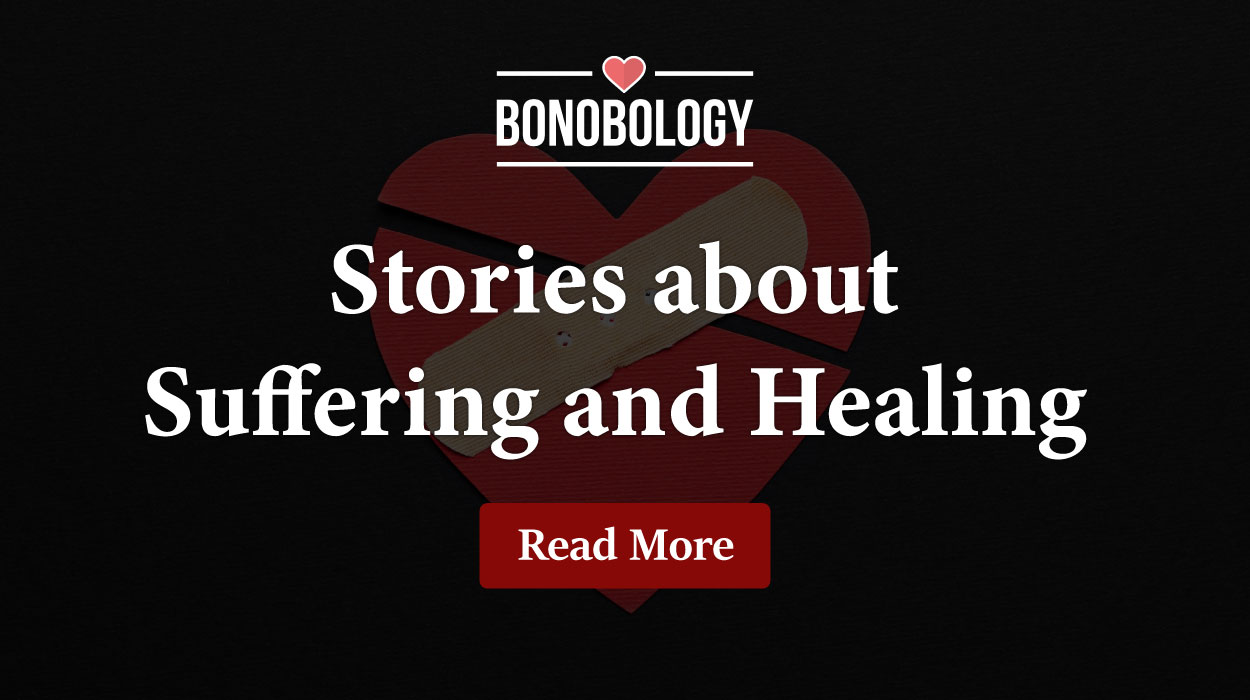
13. Learn from the experience
In the harshest of cases, you’ve probably been too rude to the person, may have accused them of something they haven’t done or may have ignored him or neglected her when they needed you the most. As a result, you may have lost them, but you need to realize that too was an experience to cherish.
Dr. Batra says, “When you recognize what this has taught you and how you will do better for yourself and for the next person you are with, you will feel less pain.” So, never stop short of learning relationship lessons from the experience, and don’t make the same mistake twice.
14. Give it time
Dr. Batra says, “The harshest of wounds heal eventually, with time.” So, no matter how tough it has been for you to deal with the fact that you’ve messed up your relationship by being mean to your partner, give it some time. Don’t drown in thoughts such as “Why can’t I forgive myself?” Time will give you the space required to collect your thoughts and reach back to them as a healed person.
And even if it doesn’t end on a good note, time will still have healed you. Talking about what taking time to heal emotional wounds should look like, a Reddit user says, “Drunk time doesn’t count. Time spent so distracted becomes avoidance so it doesn’t count. Filling the void with the wrong thing (like a rebound relationship) doesn’t count. You actually have to FACE the issue. And that part sucks so much. But, for better or worse, humans are extremely adaptive, and we will become accustomed to our new life without that partner, without that parent, without that pet, without that hand.”
Related Reading: 6 Cheaters Tell Us How They Feel About Themselves
15. Restore the relationship
If things can still be mended between the two of you, don’t waste time dwelling on negativity. If two people feel they had the best connection ever and that they really complemented each other, it’s worth giving it another shot.
Relationship expert Tony Robbins says, “When you can recognize that you hurt someone you love, you can start repairing your relationship. Simply acknowledging your partner’s pain can provide them with some small comfort of feeling seen. Likewise, Dr. Batra suggests, “Work on slowly restoring and rebuilding love with the one you hurt. Even if you lose the romantic bond, you may still retain the friendship.”
Infographic On Self-forgiveness Exercises
There are several exercises that you can adopt to address the guilt complex that may bother you after you hurt somebody. Here’s a low-down on a few such activities.
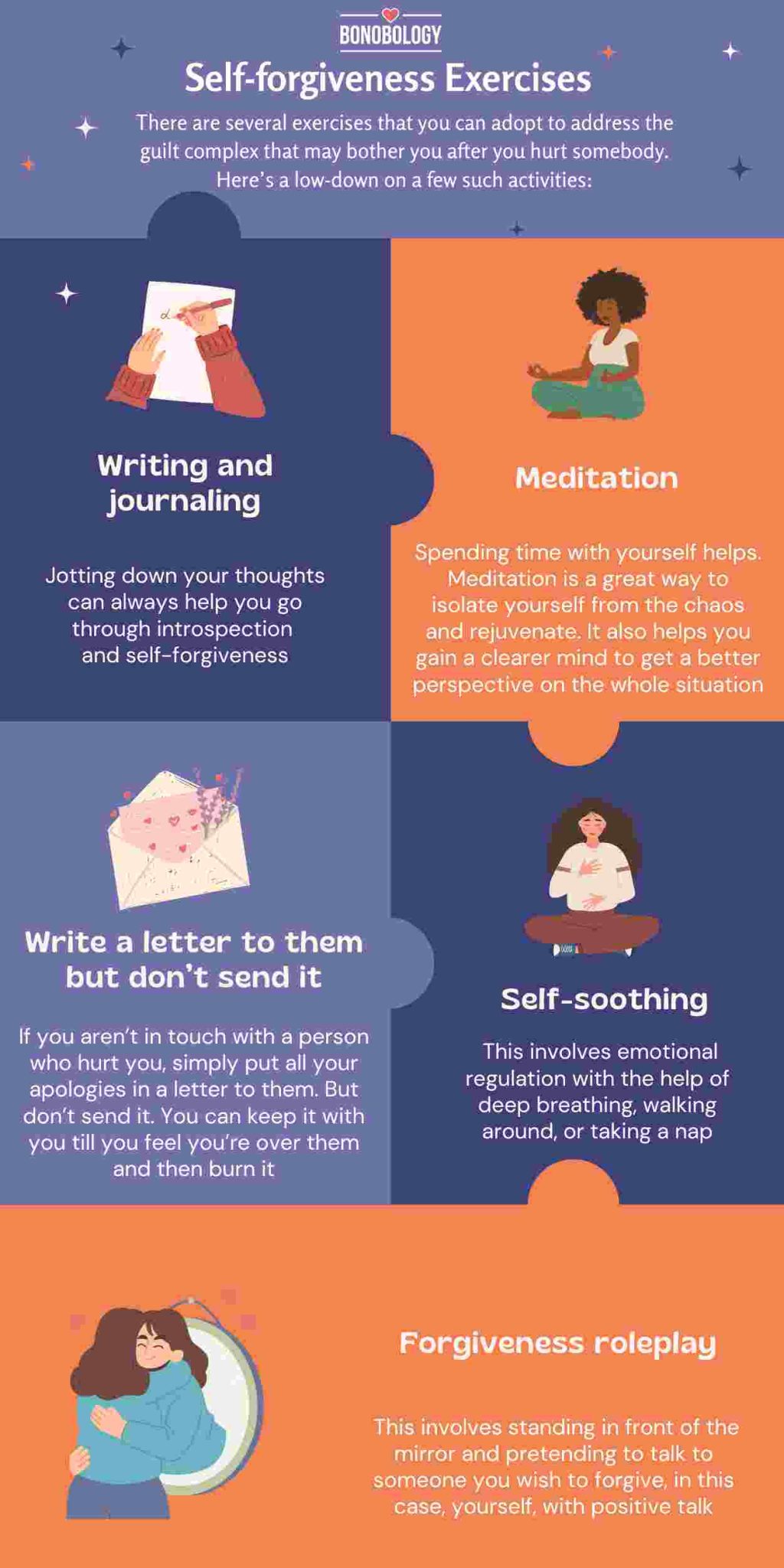
Frequently Asked Questions
1. How to overcome guilt of hurting someone?
To overcome the guilt of hurting someone, you need to be objective, avoid hindsight bias, give it some time and space, and assess the situation. You can also involve a third party for an unbiased view on the topic.
2. Why did I hurt someone I love?
You may not have consciously hurt someone you loved. You may also have been stressed or angry with some other issue, such as work or an illness, when you may have used some unsavory words. In many cases, people end up hurting their loved ones unknowingly, without realizing the impact of their words
Key Pointers
- We often end up hurting people we love or are closest to
- If you’re often asking yourself, “How do I forgive myself for past mistakes?”, it requires identifying the emotions that are causing you to self-blame
- Here’s how to forgive yourself for hurting someone you love: by being objective, recognizing your limitations, giving your partner space, and expressing remorse
Final Thoughts
As Nobel Prize-winning South African theologian Desmond Tutu said, “The simple truth is, we all make mistakes, and we all need forgiveness.” So, don’t be too hard on yourself, and realize that circumstances may have made you react a certain way. You may have had no other choice, or you may have been going through a tough time. But what is more important is to acknowledge the mistake and manage the situation effectively. The only solution to the “how to forgive yourself for something unforgivable” situation is to realize we’re all humans.
We hope this article helped you in case you were wondering how to forgive yourself for hurting someone you love dearly. So, stop fretting over “Why can’t I forgive myself for hurting him/her?” and take it easy. We also hope you end up with the person again, rejuvenating the bond. Here’s wishing you all the luck in forgiving yourself for past mistakes and looking at life with a positive lens!
Your contribution does not constitute a charitable donation. It will allow Bonobology to continue bringing you new and up-to-date information in our pursuit of helping anyone in the world to learn how to do anything.



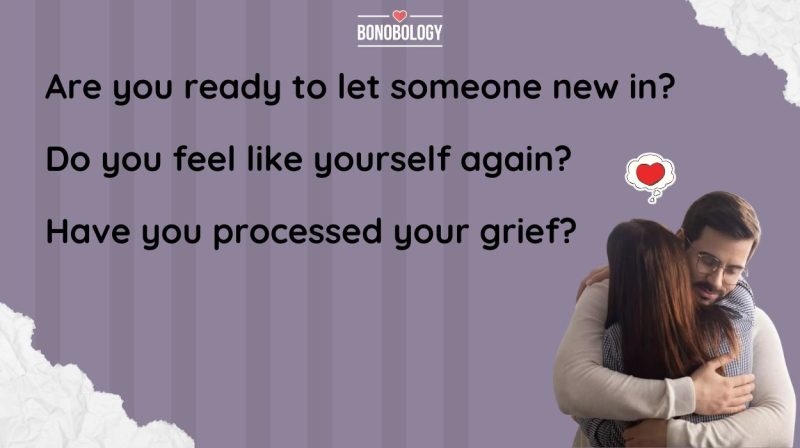
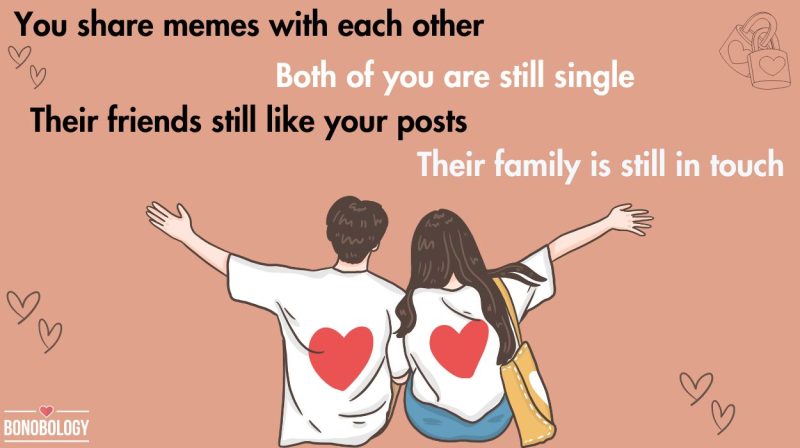













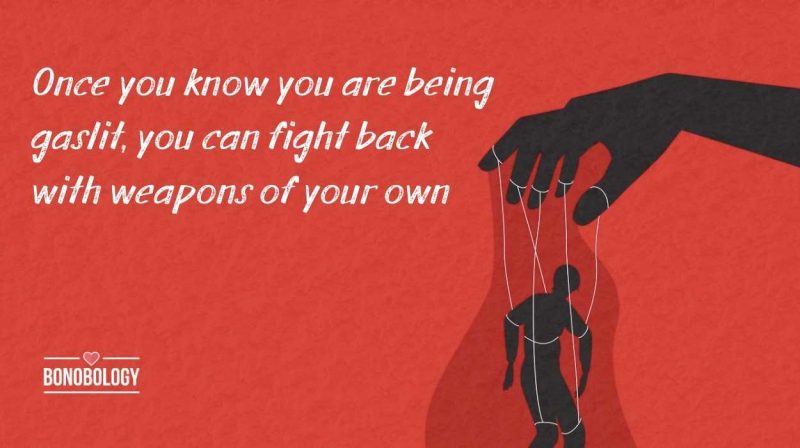
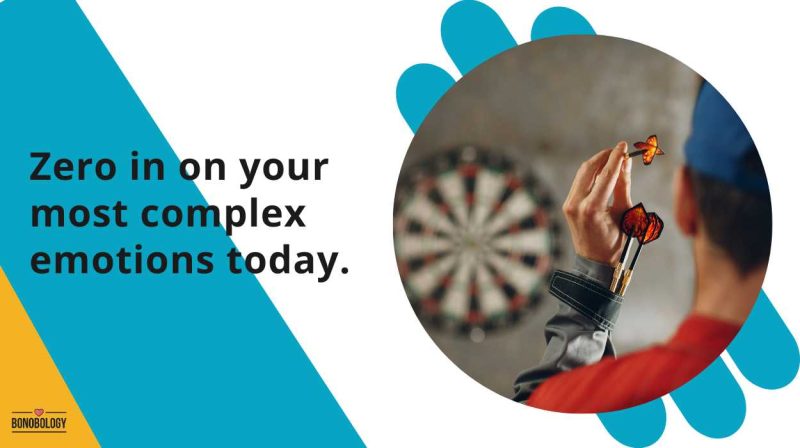


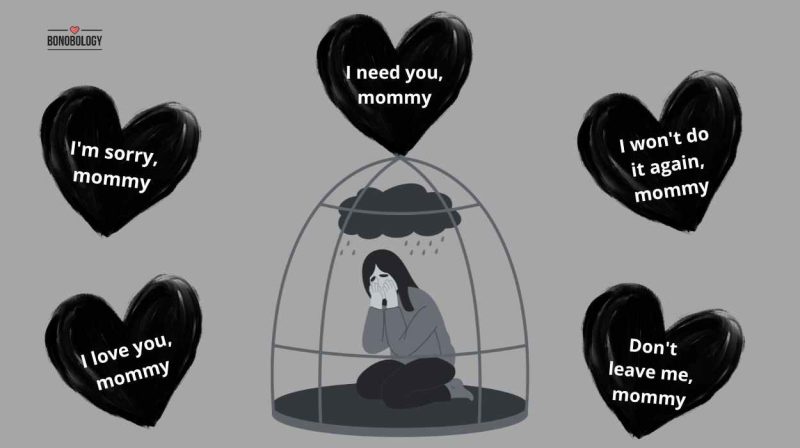
Featured
Am I Moving On Too Quickly After Death Of Spouse—How To Decide
15 Signs You’ll Get Back Together With Your Ex
How To Get Over Trust Issues — A Therapist Shares 9 Tips
How To Find Peace After Being Cheated On — 9 Tips From A Therapist
How To Forgive A Cheating Husband: 15 Helpful Tips
35 Disturbing Signs Of Gaslighting In A Relationship
What Is Narcissistic Ghosting And How To Respond To It
‘My Husband Starts Fights And Then Blames Me’: Ways To Cope
How To Rebuild Your Life After The Death Of A Spouse: 11 Expert-Backed Tips
My Husband Died And I Want Him Back: Coping With Grief
“Am I Unlovable” – 9 Reasons You Feel This Way
11 Signs Your Girlfriend Was Sexually Abused In The Past And How To Help Her
Coping With Breakups: The Must-Have Breakup Apps For Your Phone
15 Signs You Are Wasting Your Time Trying To Get Your Ex Back
Why Are You Obsessed With Someone You Barely Know — 10 Possible Reasons
33 Phrases To Shut Down Gaslighting And Silence Gaslighters
The Emotion Wheel: What It Is And How To Use It To Build Better Relationships
The Role Of Supportive Relationships In Addiction Recovery
7 Signs You Have A Verbally Abusive Wife And 6 Things You Can Do About It
Mommy Issues In Women – Meaning, Psychology, And Signs